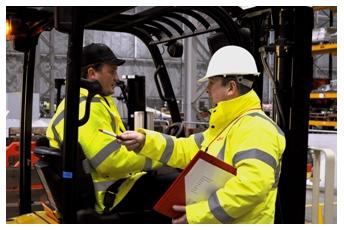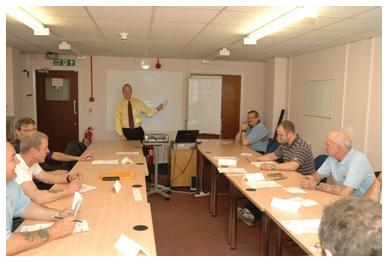The Mover looks at some of the training available and considers whether improving employees' skills should be looked at as a cost or an investment.

Three-day foundation with Kidds
Kidds Services based in Hornsea East Yorkshire runs courses covering every aspect of removals from basic operative training to estimating and fork lift truck driving.
“Our three day foundation course is very popular,” said Phillip Kidd. “We cover things like Health & Safety, furniture handling, packing, vehicle loading and unloading and customer relations. Companies send their new recruits to us rather than trying to do the basic training themselves and having unskilled people practising with their customers’ prized possessions. All our training is very hands-on and trainees work with real equipment in real-life situations rather than just sit and watch videos, which I know happens on some other training courses.”
Phillip said complacency over Driver CPC is still evident with some removals companies despite being compulsory from September 2014. “There are still some people digging their heels in and hoping it won’t happen and I’m afraid a lot of them are going to get caught out,” said Phillip.
Training for profit
A look at how proper training can save and even make m oney for movers, with David Hookins of Bridge Removals Training.
oney for movers, with David Hookins of Bridge Removals Training.
David Hookins is a specialist trainer for the removals industry. Until starting his own company three years ago, David was the field trainer for BAR. David believes that many companies see training as a necessary cost without appreciating how a proper training programme can make good commercial sense.
“The biggest mistake I see is a lack of structure in the training,” David explained. He said that people tend to do their training ad hoc. They spot a problem area and then try to solve it instead of planning for what the business needs long-term. “The result is the skills of their staff are patchy.”
The problem is that managers and owners are often too busy to take a step back and work out exactly what the business needs. “Sometimes they are unaware of the kind of training that is available,” said David.
David said that all companies, however small, should be doing basic training. “They must do manual handling training at the very least because it’s a legal requirement.” This instructs porters on the basics of lifting, both individually and in groups, and explains the use and maintenance of manual handling equipment. Training people in this way helps to prevent injuries and avoid unnecessary absences. It also protects the employer against prosecution by the HSE if there is an accident,” explained David. There are many examples of companies suffering severe consequences because they failed to provide their staff with this basic level of training.
“The next step is to provide furniture handling training,” said David. This helps people understand the fastest and safest ways of handling furniture. “When people know the right way of getting a 7ft sofa out of a 6ft 6in doorway it saves a lot of time and makes the company look much more professional. While an untrained team would be still scratching their heads, the trained crew has already got the job done.”
There can be little doubt that properly trained staff can work more efficiently, reducing the time on the job, avoiding overflows and improving the company’s image. Trained packers are able to protect items more effectively thereby reducing insurance claims and, through the efficient use of materials, reduce wastage. Driver training can reduce fuel consumption and help drivers have a greater respect for their vehicles and so prevent minor damage that can reduce a vehicle’s residual value.
Training can also help a company to expand and diversify. Many domestic moving companies, for example, shy away from European and deep sea work. But it’s not difficult to train packers in export packing techniques and office staff in import and export documentation. It can add a completely new revenue stream to a company that can be very valuable, especially during quiet times.
But there is one aspect that might be more important still: staff morale. David said that when he first goes into a new company the reception from the staff can be a bit frosty. “They think that the training is going to be a waste of time. But after the first session they then look forward to what we are going to do next time.” Training, even of the most basic kind, helps people feel that they are an important member of the team.
Training is the real key to cost savings in materials handling
There is no doubt that advances in fork lift technology have helped businesses to boost production and cut costs, but leading UK training provider Mentor warns that upgrades to your equipment count for very little if you don’t match them with sufficient investment in training.
In fact, Mentor's Technical Manager, Steve Baldwin, argues that money invested in training is just as important for your profits as buying a better truck. He explains, “Materials handling efficiency depends on the combination of a machine and an operator. A poorly trained operator will cause more damage and downtime, wear out your truck more quickly, use more fuel and deliver lower productivity. There are well-established statistics to prove that this is your biggest liability.”
 Mentor estimates that 40% of fork lift ‘incidents’ involve just 20% of operators. Recent research from the Health and Safety Executive reveals that 20% of operators lack training and or supervision, and it is clear that the extent and quality of training of many of the others varies enormously.
Mentor estimates that 40% of fork lift ‘incidents’ involve just 20% of operators. Recent research from the Health and Safety Executive reveals that 20% of operators lack training and or supervision, and it is clear that the extent and quality of training of many of the others varies enormously.
When deciding how much to spend on training, the current and potential costs of damage to your operation need to be considered. They include damage to your premises, trucks, other equipment and stock – as well as legal bills and the financial implications of stoppages.
But avoiding incidents is not the only consideration; you should also think about operator efficiency. In 2010, Skills for Logistics reported that every 1% increase in a worker’s training improves his or her productivity by 3%.
It makes sense that a well-trained operator will have the knowledge and skills to work more efficiently, and make fewer mistakes, than someone with minimal training. The result: higher output. An additional benefit can be gained in terms of fuel consumption, as a well-trained operator will know how to perform tasks smoothly and economically. Bearing in mind that the truck’s fuel is likely to cost you more, in its lifetime, than the purchase price of the truck, it’s a benefit well worth having. For example, a smooth-driving, fully trained operator will also reduce the frequency of replacing brake pads and other parts that wear or break.
For more information about Mentor, e-mail info@mentortraining.co.uk.
Learn the secrets of successful business presentations with The Mover
 During 2013 The Mover will be running one-day workshops to help people in the moving industry improve their presentation skills and overcome the fear of speaking to an audience.
During 2013 The Mover will be running one-day workshops to help people in the moving industry improve their presentation skills and overcome the fear of speaking to an audience.
Giving presentations is something that most business people are just expected to be able to do. In at the deep end, sink or swim, with little preparation and almost certainly no training. Not surprisingly business presentations tend to be dull and boring for the audience and more often than not, terrifying for the person on stage.
A typical presentation often goes something like this:
The speaker walks nervously to the lectern, head down taking care not to make eye contact with the audience. The projection screen is usually positioned in the middle of the stage with the speaker standing in the corner, usually in semi darkness. It’s more like being at the cinema than a business presentation. Then they apologise for being there; “Jim couldn’t make it so I’ve stepped in at the last minute”, etc, etc. Then comes the bad joke, just to warm things up … Not a titter. Seemingly endless slides full of tiny writing are then projected onto the sacred screen, which the speaker then reads to the audience. Why bother? They might just as well have put the thing onto automatic, left the room, and come back in when it was all over. What would happen if the projector bulb decided to go on the blink in the middle of the performance? With no hard notes, or back-up I guess the show’s over. Not good if you’ve travelled half way across the world to see it. After a half hour the whole thing eventually fizzles out, and the audience, who’ve not really known whether to read, listen or nod off; sit and wonder what it was all about.
We should all be using presentations to promote our businesses, but at present less than 10% actually do. Great presenters are made, not born, so it makes sense to invest a little time to learn how to get it right and inspire the audiences that we hope will become the customers of tomorrow.
Make 2013 the year you take up the challenge and become the speaker everyone wants to listen to. It could change your life!
For more information call David Jordan on 01908 695500 or e-mail david@themover.co.uk.
Preparation makes Driver CPC Training a positive experience
As the deadline for Driver Certificate of Professional Competence (Driver CPC) compliance draws closer, Derek Broomfield, Managing Director of training specialist Novadata explains how preparation can make a Driver CPC course a useful and positive experience.
The fact that Driver CPC is designed to demonstrate the professionalism of experienced drivers actually gives them an advantage. Research has shown that one of the best ways to learn is to relate what you are hearing to what you already know. The drivers we see are highly knowledgeable and therefore find it straightforward to relate their practical experience to the theory of a Driver CPC course. Much of what we share with them is a formalisation of their own experience. The structure of the course allows them to demonstrate their high levels of competence while gaining the Driver’s Certification Card (DQC) that they will shortly require in order to operate legally. The training room may be unfamiliar territory to most commercial drivers, but they already have the prerequisites to be high achievers at Driver CPC Training.
Training.
There are a couple of simple things you can do to prepare. First, you want to choose a course that’s going to be genuinely useful, so you need to strike a balance between exploring topics you know less about and choosing modules that you will be able to apply in your working life. Driver CPC course topics to look out for include: drive safe and stay legal; first aid; dealing with emergencies; safe and fuel efficient driving; driver’s hours and digital tachographs.
Secondly, choose a training provider that will give you a number of ways to complete your training – 35 hours isn’t always easy to fit in, so look for one that gives you the option of five-day courses to complete Driver CPC in a week, or individual seven-hour courses that you can fit in over a longer period. Some will run courses at weekends or over a couple of afternoons so you can fit them around your schedule – flexibility is essential as the deadlines for compliance approach. If you have a number of drivers who need to complete Driver CPC, you should also have the option of having the trainer come to you, and they should be able to tailor the course around what you do as a business to make it as relevant and practical as possible.
You also need to apply the same principles as you would to your normal routine, and that includes getting adequate sleep before the course; you need to be alert just as you would before driving. Secondly, it’s important to stay hydrated, so don’t skip breakfast and make sure you take in fluids during the day – we include regular breaks for this very reason. Lastly, educationalists tell us that if you discuss what you’ve learned with a friend or colleague, you will remember it in more detail; so share your knowledge over a coffee when you get back to the workplace – you’ll help the next person who comes on the course or refresh the knowledge of someone who has already completed it.
You will need to repeat Driver CPC Training every five years from September 2014, so it’s now a fact of life. Adopting the attitude that you will make it as positive an experience as possible will benefit everyone, especially you.
For more information visit www.novadata.co.uk.
Read the Editor's next pick